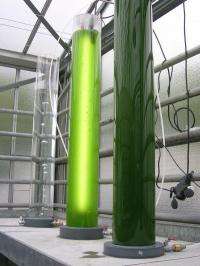A project to research biological and chemical aspects of microalgae to fuel approach

The Basque Institute for Agricultural Research and Development, Neiker-Tecnalia, coordinates a research focus on determining the feasibility of employing microalgae as a cost-effective feedstock for fuel production, in an environmentally sustainable way.
The project will cover the whole process of microalgae oil production, including culture management for sustainable high oil yields, oil conversion to biofuel, and reuse residual biomass from the oil extract process for biogas production.
In this project participates CENER (Spanish National Centre for Renewable Energies), Tecnalia Research & Innovation Foundation, University of the Basque Country (UPV-EHU), Environment and Safety Association in Aquitaine (APESA), and Agro Resources Application and Transformation Centre (CATAR-CRITT), together with the support of Acciona. A key part of the project will be the ongoing interaction and collaboration between all partners.
Biodiesel is a synthetic liquid biofuel that is mainly made from oleaginous plant oils, like palm or soybean. In recent years, microalgae have been pointed as the next feedstock for biofuels, due to their very high productivities when compared with the conventional energy crops. However, many problems have hampered industrial biofuel production from this biomass.
Given the need to solve problems associated to the development of this technology, Neiker-Tecnalia, together with the group of organisations involved in the project, wants to provide technological solutions applicable to industrial scale thus, contributing to the utilization of microalgae as renewable energy source. The project, called Energreen, is scheduled to go on for two years.
Neiker-Tecnalia researchers believe that traditional methods of growing microalgae can be improved by modifying metabolism of these microscopic algae. Metabolic regulation is a tool to encourage microalgae cells to produce and accumulate more oil. Once this goal has been reached, scientists will work on developing new systems for oil extraction and its subsequent transformation into biodiesel, by using traditional chemical methods and enzymes immobilised on magnetic carriers. This target will be achieved without forgetting the fact that these processes need to be applicable on an industrial scale and respect the environment.
After oil extraction from microalgae, the remaining biomass fraction will be used to generate biogas, other renewable energy resource, through an anaerobic digestion process. For this purpose, this residual biomass goes through a decomposition process in an oxygen-free environment, producing methane and other gases.
Microalgae help to safeguard environment, not only as fuel producers of a renewable origin, but also by absorbing, during their growth, large amounts of CO2 coming from industrial gases which lead to global warming. In addition, biodiesel is biodegradable and does not contribute to the greenhouse effect, since CO2 released during its combustion is quickly absorbed by plants and trees, unlike diesel originated from petroleum.
Provided by Elhuyar Fundazioa